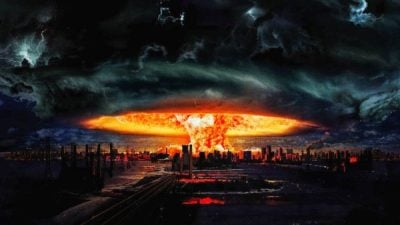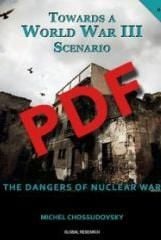Echoes of Dr. Strangelove: “Volatile Security Environment”, The last Thing we Need is “a Superpower Nuclear Arms Race”
Strategic Posture Review: Commission argues that the US should consider building and deploying more nuclear weapons.

All Global Research articles can be read in 51 languages by activating the Translate Website button below the author’s name.
To receive Global Research’s Daily Newsletter (selected articles), click here.
Click the share button above to email/forward this article to your friends and colleagues. Follow us on Instagram and Twitter and subscribe to our Telegram Channel. Feel free to repost and share widely Global Research articles.
***
The world is at war, with active or simmering conflicts in Ukraine, Israel/Palestine, Somalia, Ethiopia, Sudan, Libya, Syria, Yemen, and Nagorno-Karabakh, destabilizing coups in Niger, Burkina Faso, Guinea, Chad, and Mali, and other nations on the verge of civil or interstate conflicts. The last thing we need in this volatile security environment is an accelerated superpower nuclear arms race.
But don’t tell that to the members of the Congressional Commission on the Strategic Posture of the United States, which has spent the past year looking at the current challenges facing the United States and coming up with a solution that would make the militarized competition of the Cold War era look quaint.
The commission’s report brings to mind Stanley Kubrick’s 1964 classic, “Dr. Strangelove: How I Stopped Worrying and Learned to Love the Bomb.” The film underscored the absurdity of the nuclear doctrines of the time, and the insanity of the mindset that had captured political and military leaders of that moment, in an at times humorous take on a subject with a deadly serious potential impact. The new congressional commission report implies that the current strategic environment is more dangerous than at the height of the Cold War, and it adopts an equally dangerous mindset in addressing that alleged situation. Whatever one thinks of the commission’s assessment, its recommendations would increase the risks of war among the superpowers, not reduce them.
The commission’s analysis and recommendations are grounded in an alarmist view of the current geopolitical landscape that departs significantly from reality. Early in the report, the commission makes the following assessment of the challenges facing the United States:
“The new global environment is fundamentally different than anything experienced in the past, even in the darkest days of the Cold War. Today the United States is on the cusp of having not one, but two nuclear peer adversaries, each with ambitions to change the international status quo, by force, if necessary: a situation which the United States did not anticipate and for which it is not prepared.”
First and foremost, it is not clear that either Russia or China seeks or could achieve global domination based on the use of force. Whatever Vladimir Putin’s aspirations may be, the war in Ukraine has exposed deep flaws in Russia’s military capabilities that make it clear that it is in no position to threaten any of the 31 members of the NATO alliance, much less operate on a global basis. It is essential to continue to provide Ukraine with the assistance it needs to defend itself, but assertions that Russia is poised to reshape the entire international system “by force” in light of that conflict are overblown.
As for China, its main challenges to the United States are political and economic, not military. Its increasing military power is primarily focused on its own region, including on the possibility of taking Taiwan by force at some unspecified future date. But the best way to prevent a U.S.-China conflict over Taiwan is to re-establish a common understanding on its status, along the lines of the “One China” policy that has kept the peace in the Taiwan strait for five decades. Doing so would mean that the United States would not support political independence for Taiwan and China would forswear seeking unification with the island by force. Better crisis communications and a “common good” approach to resolving areas of difference – as proposed in a recent issue brief by my Quincy Institute colleague Jake Werner – should supplement the return to a common view on Taiwan. And cooperation on addressing potential existential threats like climate change and preventing future pandemics should take precedence over aggressive posturing and bellicose rhetoric. Sabre rattling and military buildups will make a war over Taiwan more likely, with disastrous consequences for all concerned.
Last but not least, the active U.S. nuclear stockpile of 4,500 long-range nuclear weapons, with over 1,600 deployed, is more than enough to dissuade Russia or China from attacking the United States, for fear of having their societies devastated in return. But a large deployed arsenal does pose a risk of a nuclear confrontation by accident or miscalculation, and an arms racing environment of the kind recommended by the congressional commission would only make matters worse.
Unfortunately, once the commission adopted its overly pessimistic view of Russian and Chinese capabilities and intentions, its recommendations for a more combative U.S. posture followed closely behind. The Pentagon is already in the middle of a $2 trillion, three decades-long initiative to build new nuclear-armed missiles, bombers, and submarines, with new warheads to go with them. Astoundingly, the commission argues that these investments are not enough, and that the U.S. should consider building and deploying more nuclear weapons, even as it endorses dangerous and destabilizing steps like returning to the days of multi-warhead land-based missiles while placing nuclear-armed missiles in East Asia. These steps would only introduce more uncertainty into the calculations of China and Russia, making a nuclear confrontation more likely.
In addition to increasing nuclear risks at what is certain to be an exorbitant price – an issue the report mentions but refuses to address in detail – the document argues for the United States to expand its nuclear arsenal first, and worry about forging significant arms control agreements later. This approach is precisely backwards, and could spark a three-way arms race that will take arms control off the agenda for years to come.
Sometimes congressional commissions come and go without leaving any substantial imprint on government policy. Let’s hope the recommendations of the strategic posture commission fall into that category. But the more likely outcome will be that nuclear hawks – and even moderates who should know better – will brandish the report in their efforts to promote a nuclear buildup that is both enormously risky and immensely expensive. Pushback from advocates of nuclear reductions needs to be heard loud and clear by members of Congress, the administration, and the broader public. We survived the Cold War nuclear arms race in part by sheer luck – we shouldn’t take that risk again.
*
Note to readers: Please click the share button above. Follow us on Instagram and Twitter and subscribe to our Telegram Channel. Feel free to repost and share widely Global Research articles.
William D. Hartung is a senior research fellow at the Quincy Institute for Responsible Statecraft. His work focuses on the arms industry and U.S. military budget.
Featured image is from The Unz Review
 “Towards a World War III Scenario: The Dangers of Nuclear War”
“Towards a World War III Scenario: The Dangers of Nuclear War”
by Michel Chossudovsky
Available to order from Global Research!
ISBN Number: 978-0-9737147-5-3
Year: 2012
Pages: 102
PDF Edition: $6.50 (sent directly to your email account!)
Michel Chossudovsky is Professor of Economics at the University of Ottawa and Director of the Centre for Research on Globalization (CRG), which hosts the critically acclaimed website www.globalresearch.ca . He is a contributor to the Encyclopedia Britannica. His writings have been translated into more than 20 languages.
Reviews
“This book is a ‘must’ resource – a richly documented and systematic diagnosis of the supremely pathological geo-strategic planning of US wars since ‘9-11’ against non-nuclear countries to seize their oil fields and resources under cover of ‘freedom and democracy’.”
–John McMurtry, Professor of Philosophy, Guelph University
“In a world where engineered, pre-emptive, or more fashionably “humanitarian” wars of aggression have become the norm, this challenging book may be our final wake-up call.”
-Denis Halliday, Former Assistant Secretary General of the United Nations
Michel Chossudovsky exposes the insanity of our privatized war machine. Iran is being targeted with nuclear weapons as part of a war agenda built on distortions and lies for the purpose of private profit. The real aims are oil, financial hegemony and global control. The price could be nuclear holocaust. When weapons become the hottest export of the world’s only superpower, and diplomats work as salesmen for the defense industry, the whole world is recklessly endangered. If we must have a military, it belongs entirely in the public sector. No one should profit from mass death and destruction.
–Ellen Brown, author of ‘Web of Debt’ and president of the Public Banking Institute

